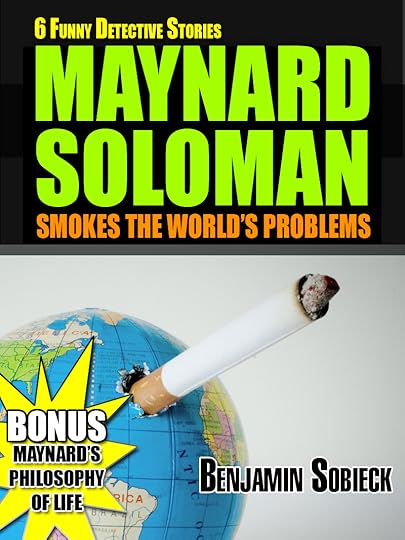Benjamin Sobieck's Blog, page 38
May 31, 2012
The Mean Side of Minnesota Nice
If you can't embrace Minnesota Nice, you need to get the hell out of my state.
This and other contradictions are explored in my interview with Black Heart Magazine here.
Many thanks as always to Laura Roberts and the Black Heart crew. She and the 'zine have been big supporters of the Maynard Soloman series, which is discussed in the interview. Roberts also writes humor, and I encourage you to read my review of her Rebels of the 512 novel here.
See? I'm Minnesota Nice incarnate. Now scoot your arse here to read the interview.
P.S. Black Heart is looking for a fiction editor. Here's your chance to be a part of the literary mutiny.
May 30, 2012
New Release: Maynard Soloman Smokes the World's Problems
6 Funny Detective Stories - Maynard Soloman Smokes the World's Problems is available exclusively at Amazon for $3.19. That's a heckuva deal since the six individual short stories go for 99 cents a pop.
Here's the description:
Fans of short detective stories with a side of sarcastic political satire, you've found your man.
Meet Maynard Soloman, gal-damn detective. Some s ay he's crusty, profane and clueless. But if you ask him, he solves the world's problems one case at a time.
ay he's crusty, profane and clueless. But if you ask him, he solves the world's problems one case at a time.
This collection features six pressing issues of the day, plus tons of bonus features.
1. Maynard Soloman Solves the War on Drugs
2. Maynard Soloman Fixes Social Security and Eats a Pony
3. Maynard Soloman and the Job-Nabbin’ Illegal Immigrants
4. Maynard Soloman Proves Santa Claus is Real
5. Maynard Soloman Legalizes Gay Knot Tying
6. Maynard Soloman Takes the Bus to a Strip Club
Bonus: The Philosophy of Maynard Soloman
Bonus: How to Cuss Like Maynard Soloman
Bonus: Maynard Soloman’s Two-Beer Critter Marinade
Bonus: Maynard Soloman’s Guide to Milk and Cookies
Bonus: 10 Signs Your Kid is in a Cult
Bonus: Maynard’s Guide to Tipping
* Author nominated for Best Short Story of 2011 by Preditors & Editors Readers Poll.
Click here to get 6 Funny Detective Stories - Maynard Soloman Smokes the World's Problems for $3.19 exclusively from Amazon.
May 29, 2012
Peak at Cover: Maynard Soloman Smokes the World's Problems
Comng soon: 6 Funny Detective Stories - Maynard Soloman Smokes the World's Problems. What do you think of the cover?

May 26, 2012
I Need Your Help to Solve All the World's Problems
I need your feedback about this essay. I wrote it for an upcoming Maynard Soloman collection, 6 Funny Detective Stories - Maynard Soloman Solves the World's Problems.
I plan on including this essay as part of a bonus feature for the collection. Tell me what you think. Too complicated? Not complicated enough? Stupid? Not stupid enough? Leave a comment below.
***
The Philosophy of Maynard Soloman, Gal-Damn Detective
Let's set the record straight right now: Phone books need to go away.
Their time in history is over, but still they come every six months or so. The people who deliver them don't want them, either. That's why they dump them off at your door. They're too shiny and thick to just throw out (guilt) and recycling won't take them (absurd). You can't re-gift them, either, not even to little kids. Their sole purpose anymore seems to be perpetuating an anti-shoe agenda.
"There are simply too many shoes. How can we prevent people from buying more?" the phone book folks must say during board meetings. "Ah ha. We'll just keep printing these phone books. People will start a stack of them in their shoe closets next to the door. They'll have no choice but to not buy shoes."
It only follows that phone book companies must be made entirely of men. But I digress.
Don't get me wrong. I don't hate printed material. I still subscribe to the tattooed trees the Star Tribune cranks out of Minneapolis. It's just that phone books have turned into obligations forced upon other people who don't want them in the first place.
Which brings me to Maynard Soloman, gal-damn detective. I've been asked on a few occasions by readers about the underlying philosophy of the short story series. Are you trying to make a political point? Are you a liberal? A conservative? Or just an idiot with a keyboard?
(Hang with me, this will all make sense.)
Except for the last one, none of those are true. Maynard Soloman is my way of dissecting how humanity solves its problems. In 6 Funny Detective Stories, you'll find the Ol' Badger up against the War on Drugs, Social Security, illegal immigration, gay marriage and public transportation. (The existence of Santa Claus doesn't exactly count for the point I'm trying to make here.)
The underlying philosophy is this: Problems aren't fixed, they're replaced. This is the great folly of humanity, and it's the perfect foundation for a satire series.
Here's what I mean about replacing problems.
Problem: People use drugs to get high, which affects productivity in the U.S. and elsewhere.
Solution: Wage a War on Drugs to go after users and producers of drugs.
New Problem: Any gain in productivity is eaten up by the money it costs to wage the War on Drugs. Crowded prisons, expensive law enforcement operations, an overburdened court system and other socio-economic ills can be linked back to the very thing trying to cure these problems.
See what I mean?
Now, you don't have to think one way or the other about the War on Drugs to appreciate Maynard Soloman stories. I'm not using them to tell you what to think. What I'm asking you to consider is that when the string-pullers of the world set out to fix one problem, they create at least one more.
This isn't unique to our times. It's unique to our species. World War I was supposed to be the "War to End All Wars." What did humanity get in return? World War II. That gave us the Cold War, out of which the War on Terror was born. Conflicts don't end, they're replaced.
What's a guy to do?
Enter Maynard Soloman. He is the essence of the American individualist spirit. He's mobile, entrepreneurial and out for his own interests. He's a little guy up against the world's biggest problems, represented by the clients he takes in his detective business.
By the end of each story, within the microcosm of his own experiences, he manages to fix those big problems. He's not changing the system, though. That would have meant becoming the system, which would only have replaced the problem. He's changing people, one at a time. It's simpler and more effective to do it that way.
As I write this in mid-2012, it seems much of the world is trying to change the system. Massive social and political movements across the globe (the Arab Spring, the Occupy movement, the Tea Party, etc.) are looking to fix problems.
Although well-meaning, it's my cynical belief that if these movements are successful in a political sense, they'll wind up substituting in new problems. The Arab Spring will trade one kind of tyrannical government for another. The Occupiers will usher in new regulations that hurt the people they're trying to help. For all its talk of economic freedom, the Tea Party will perpetuate costly social policies, such as the War on Drugs and the War on Terror.
The real fruits of these movements will occur at the level of the individual. Their messages are the same as what's been sought after for eons: People want to live decent lives. If we can all respect that fact within each other, changes will begin at the bottom and work their way up.
Which brings me right back to phone books. One solution would be to become a phone book executive, to change the system from inside. Yet I have a feeling if I did, it'd be in the best interests of keeping my job to order another print run this coming year. At that point, my solution to the phone book problem would have perpetuated the problem I set out to solve.
It'd be far more effective if people, one at a time, just stopped paying any attention at all to phone books.
See what I mean? You can't change systems from the top down without introducing new problems. You can only change people, work from the bottom up.
Maybe it's better just to lie low. Buy a Winnebago without a home address, like Maynard. Solve the world's problems one person at a time.
If you ask me, it's the only way we will.
Actually, don't ask me. The above only refers to the philosophy underneath the stories. If I was king of the world, I'd fix everything by instituting a strict diet of booze, blindfolds and bazookas, then see what happens.
May 17, 2012
The 3 Wise Men: Money, Guns and Lawyers
Been writing. That's what writers do. No need to send the three wise men. In the meantime, the house band will be passing the time. Please tip your bartenders and servers.

May 4, 2012
THE BITCH: A Hardball Q&A with Author/Ex-Con Les Edgerton

Les Edgerton's The Bitch is one of the most arresting crime novels I've read this year (no pun intended). It chronicles ex-con Jake Bishop's attempts to avoid "The Bitch," a slang term for "habitual criminal." It's similar to the Three Strike Rule. Jake already has two strikes when a prison buddy calls him up for one last job.
The yarn itself was compelling on its own, but I suspected I was reading a story-within-a-story. Author Edgerton served time in the same prison as his Jake character. His colorful past is already well-known in the crime fiction world, but I still wanted to pick his brain. How much of the story was true?
Fortunately, the author was more than happy to do an interview. Here it is, unedited and unfiltered. Just 100% pure Edgerton. Read the whole thing. His real-world answers could put fiction to shame.
P.S. Click here to buy The Bitch on Amazon. It's available at all other fine e-retailers, too.
* * *
BEN: It's impossible not to compare the lead character in The Bitch , Jake Bishop, to yourself. You both did time in Indiana's Pendleton Correctional Facility, for example. Was The Bitch catharic to write?
LES: First, a small correction. When I was in prison, it was “Pendleton Reformatory.” Only, it wasn’t a “reformatory,” but one of the two Indiana maximum prisons, the other one being Michigan City. The only difference between them was that cons 30 and younger were sent to Pendleton and cons older than 30 went to Michigan City.
The “correctional facility” is a recent name change and nowadays they have a juvie facility in addition to the main prison. While I was there, then-President Johnson conducted a national study and concluded that Pendleton was “the single worst prison in the U.S.”
And, it was. There were eight riots during my stay, not including the one I walked in on when first sent up.
As to your question, Ben, writing it wasn’t much in the way of a catharsis at all. For a couple of reasons.
One, I’ve written about my experiences there in many of my previous novels and short stories, and so the “catharsis” value has pretty much been exhausted by now.
And, two, I’ve never lost a lot of sleep over my experience there. I was a criminal and going to prison is just part of the deal of being “in the life.” That “If you can’t do the time, don’t do the time” is pretty much the way it is. Just a part of the job description. Criminals are pretty good at compartmentalizing things and when you’re in the joint, you’re in the “zone” and not outside, on the bricks in your mind, and when you’re out on the bricks, you don’t waste a lot of time thinking about the joint.
I see a new breed of criminal today on TV where these guys are crying when they get caught. What kind of punk cries?
BEN: One of the themes throughout The Bitch was having to make a bad choice in the pursuit of something better. For example, kill Person X to save Person Y, yet create a new problem with Person Z. It's almost like the game is rigged. Does this reflect your view of the world, that we're doomed to a certain fate no matter what we choose?
LES: Ah! So you’re asking me if I have a Calvinistic view of life—that predestination thingy!
Well, on Monday’s I think that, and on Tuesdays I don’t. On Wednesdays, I don’t care.
To be honest, on most days I don’t care. I have a different vision of morality and God and all that. Most days, I fit the definition of a nihilist quite accurately. Expediency is what gets me through life.
For instance, I don’t perform criminal activities any longer and it’s not because I had some kind of “come to Jesus” moment or some kind of epiphany. I’ve just weighed the pros and cons of performing a criminal act and since I’ve been there (inside the walls), I have a clear idea of what that’s like and so far I haven’t come across a crime whose possible rewards outweigh the possible penalties.
If I ever do, I’m pretty sure I’m off that good citizen dais and out there doing the crime. But, it’ll have to be the perfect crime with an enormous upside. At my age, to go back to the joint is a certain death sentence and I’m not quite ready for that. Incarceration really is a good deterrent once you’ve experienced it.
BEN: On that same note, Jake is sucked back into the world of crime despite trying to get as far from it as possible. Is this a fear you were exorcising through Jake's character?
LES: Not really, but I can understand Jake completely. He’s the guy I could be if I had a moral view of the universe. Except, he’s really kidding himself that he’s a moral person.
In the end, he’s as nihilistic as I am. Not trying to come across as some kind of “badass” hardened criminal type, but I really don’t feel like I have a lot of fears. I’ve done time, been homeless, been shot at, been stabbed, had just about everything you can imagine thrown at me and can never remember feeling anything at the time than the same thing—that what was happening was interesting and would make great material for my fiction.
Detached is the best way to describe my feelings at any of those times. I’ve always thought “what’s the worst that can happen” in any situation I’ve been in, and never has that “worst thing” been all that bad.
It’s the feeling I had when I was in a shootout with what I thought were cops in a grade school and it’s the feeling I had when my call girl girlfriend Cat had stabbed one of my other girlfriends and was trying to eviscerate me. “What’s the worst that can happen here?”
In those cases (and others) the worst was death, and hey… nobody gets out of life alive, so what’s the fuss all about? It’s going to happen to all of us (death) and if you worry about it, it seems to me that you’re kind of… what’s the word?... oh, yeah… stupid. It’s going to happen at some time, so when it does what’s awakened is a feeling of avid curiosity. What’s it going to be like?
BEN: "The Bitch" refers to the slang term for "habitual" criminal, which others refer to as the "Three Strike Rule." Wind up in prison three times, and you're "out" for life. Advocates of these laws say they deter crime. Yet in your novel, it seems to encourage it. Jake will do anything - no matter how extreme - to avoid a third term in Pendleton. Which side of this issue do you fall on?
LES: These “law and order” types—politicians and the media, especially—don’t have a clue what deters crime. Or, rather, I suspect they do, but their agenda isn’t to keep people out of prison. It’s to gain votes for pols (for being seen as “tough on crime") and for viewers and readers (in the case of media.). It’s sexy and it’s popular to appear to exhibit the attitude of “lock ‘em up and throw away the key.” The things they do don’t deter crime in the least.
Here’s what deters crime. Barber school. (I’m using this as an example.) When I was in Pendleton, I had a much higher degree of education than most—I’d graduated high school and spent four years in the Navy and was a radioman and cryptographer. The average educational level of my fellow inmates was about third grade. When most of these guys got out—and most do get out, which straights don’t seem to realize will happen—they have no skills to gain any kind of meaningful employment. Which means, they’ll be on the street again, with no way to gain money for a meal, for a place to crash, for any of that. So, they’ll end up doing what they know how to do. Stick up a 7-11, sell drugs, break into a place.
Well, Pendleton at that time operated under the philosophy of rehabilitation. They actually meant it. The barber school was the best “lick” in the place and inmates fought over getting in. The reason was, the training was the best in the country and as a result barber shop and hairstyle salons were waiting in line to hire us. On the bricks, a guy in a civilian barber school got to cut maybe 1-2 heads of hair a day. He went to school for seven months. In Pendleton, we cut 12-14 heads a day. For at least two years and often a lot longer. When we were released, we were just far, far better at cutting hair than anyone else. Our services were valued and highly. I had to field offers of employment from literally hundreds of places. Guys from civilian barber and beauty schools couldn’t buy a job. They took our leavings, basically.
The result was, about 82% of us stayed on the bricks. We made serious money and got married. Bought homes, joined the Rotary, had kids and coached Little League. Why? Because we had excellent jobs. I was making $500 a week in 1968, which was great money in those days and it went up from there. Legitimately.
And, as great as the barber school was, it was virtually the only program in Pendleton that had this kind of success rate. The reason was we learned a very marketable skill. The second-best lick was the machine shop. Theoretically, guys could learn to be machinists and go out and secure a good job. The problem was, the machinery they learned on was outdated by at least 50 years and so the inmate who’d gone through that program wasn’t much better off than the guy who worked in the laundry or in the chow hall. The barber school program was a huge success and showed what was possible. Very few guys who went through the barber school came back.
But then… civilian barber students started protesting that all the good jobs were going to ex-cons and support for the program went away… Lock ‘em up and throw away the key…
The thing is, nothing the “authorities” do these days deters crime. I can’t think of a single thing. Warehousing criminals is the worst thing to ever happen for a lot of reasons space doesn’t allow me to go into here. What’s needed is a realistic look at criminals and prisons and the wrong-minded approach pervasive in corrections today, but that’s a pipe dream. Too many people making a lot of money off crime and I’m not referring to the criminals.
BEN: "Prison rape" is often the punchline in a joke. The Bitch takes a different approach and details the long-term psychological damage of rapes behind bars. The survivors might be prisoners, but they're still human beings. Is that a point you were trying to make?
LES: First of all, “prison rape” doesn’t go on nearly as much as straights think it does. It’s actually fairly rare. If one were to believe movies, books, and comedians, one would think it’s all that goes on in the joint. And, it doesn’t.
In fact, in my two+ years inside, among over 2,000 inmates, I was aware of maybe 5-10 such instances. There were more going on, I’m aware, but those were all I was aware of. This is one of the biggest myths perpetuated. It’s not a sexual thing—it’s a power thing and most often between blacks and whites. Whites don’t rape blacks as a rule, but blacks will often try to rape whites. In their minds, shows they’re in control.
I got hit on twice in two years. The first was in jail, not prison, so only one time in prison. And, that came about after I got my parole and made the mistake of talking about it. (You don’t tell anyone as there are lots of guys who can’t stand it that someone’s getting out and they’re not and they try their best to fuck up a guy’s parole.) A black guy got in my barber’s chair (a no-no—blacks don’t sit in white barber’s chairs and vice versa, unless one of them’s a punk), and told me he was going to make me his kid.
I’d made up my mind what I was going to do if that ever happened and I did exactly that. Grabbed my straight edge and went after him, trying to cut his throat. Chased him all over the barber school and then Jonesy, a black hack, caught me, ran me into the office, locked the door, and took the black inmate over to his dorm. Jonesy could have written me up—and he should have—but he didn’t, which saved my life as I would have lost my parole and I knew if I had to do the whole five years of my bit, I’d have to kill the dude who fronted me and once I did that, I’d be in there the rest of my life. So, Jonesy saved my life, in my opinion.
The guys who get hit on are guys who are all alone. In Pendleton, that meant guys from small towns who weren’t career criminals before and didn’t know anyone. I was from South Bend and had been pulling jobs for years and knew everybody from South Bend and so had all kinds of buddies who had my back as I had theirs. A good example of what happens is one day a new kid came onto our tier from a small town—Tipton—and he seemed like an all-right guy, albeit naïve, and I kind of took him under my wing. Well, a black dude started romancing him (although the kid didn’t realize what he was doing)—giving him cookies, cigarettes and all that.
I warned the kid that he needed to get away from this guy, but he was convinced the black guy was just trying to be friendly. He was. A week later, he’d turned the kid out. Big-time. Not just for himself, but he put the kid on the block. First thing he did was get a ball-peen hammer and knock out all the kid’s front teeth. (Better for blow jobs.) A week after I’d tried to warn him off, the kid was roaming the aisles on movie day, giving blow jobs to other inmates for cigarettes and green, turning them over to his new “friend.” Sad, but he was too ignorant to know when help was offered him.
But, that’s where most rapes come from. It’s just not a common deal at all. It wasn’t something most of us even think about or worry about at all. Seems to happen a lot in movies and in novels written by writers who don’t have a clue.
All that said, I’ve got rape in THE BITCH, don’t I! But, both took place in jail, not prison. One is far more likely to be raped in jail than in prison for several reasons. One, many guys in jail haven’t done time so all they know is from books and movies. So, they try to imitate what they think goes on, especially black guys. Not trying to come across as a racist, but it is what it is.
Second, and more important, guys in jail are hours or mere days away from being under the influence of drugs and that makes you do things and act in ways you wouldn’t when sober. Third, often guys in jail haven’t made the alliances they will in prison and so are more at risk. Jail and prison are vastly different animals.
Your original question was if I was trying to show that survivors or prison rape were still human beings. Well, not consciously. I simply assume they are (still human beings). I think a lot of straights think all criminals are rapists, child-molesters, serial killers and the like. The fact is, the vast majority of convicts are involved in crimes of property more than in crimes of person. Far more guys inside for burglarizing bars and gas stations, for stealing cars, for sticking up 7-11’s, for check-kiting, for assault on the wife who they walked in on as they were banging their best friends, than are in there for the crimes commonly portrayed on TV.
So, yeah; I think most of the guys inside are still human beings. Books, TV and movies are all engaged in sensationalizing prisons and are a long way off from any accurate portrayal. That series on MSNBC is typical bullshit—if a person believed that show, they’d think most inmates are pumping iron all day long or are total nut jobs. Totally unrealistic show, but if they showed the boredom that prison truly is, ratings would plunge.
BEN: You're candid about your colorful past, even writing about it in your bio on your website. Why? As you point out in The Bitch , people can react negatively to finding out one is an ex-con.
LES: For years, I did just that—kept my past secret. Then, I got tired of listening to people who usually had it all wrong. The truth is, most criminals are pretty much like your average citizen. Not that many hang out in strip clubs, have tatts, use drugs and drink like there was no tomorrow. Not that many have killed someone. Not that many have raped or been raped in the joint.
If you took the population of the average prison and set these folks down in the food court of your average mall and dressed them “normally” I doubt if anyone looking at them or listening to them would ever think they were any different than anyone else who might be in the mall. In fact, the average citizen probably talks to an excon every week and doesn’t have a clue. At one time, for instance, I could walk into just about any barbershop in Indiana and almost always someone cutting hair there would be someone I knew from Pendleton. The average lame who came in for their haircut didn’t have a clue. Well, we’re out there in your neighborhood.
Some of us are working in fast food, some are selling insurance, some are working on your car, some are taking your dry cleaning and handing you the pickup ticket, some are managing movie theaters… you name it, ex-cons are doing the same jobs and living the same lives as anyone else. Remember, I was a college prof (still am), was in college and elected student body president, worked as a reporter for The South Bend Tribune, sold Prudential life insurance, worked as a headhunter for an executive recruiting firm—in short, did a whole bunch of jobs that, if you believed bad novels, bad movies, and bad TV wouldn’t be the case. But it is. We’re (ex-cons) are in every segment of life on the bricks and doing virtually any job you can think of.
BEN: Let's wrap up with a lighter question. What would be on the Les Edgerton sandwich?
LES: A tunafish sandwich made with the recipe of this place I used to go to in Bermuda. I’ve never tasted anything like it since. And, I don’t even like tunafish much, but this sandwich was awesome. Second choice, would be fried oysters.
Thanks for having me on, Ben. This was fun!
May 2, 2012
What's New?
On my list of crime fiction book-type things to-do:
1) Catching up with reviews for things I've read.
2) Giving and receiving a couple interviews with other great crime authors.
3) Writing. Got some ideas that need exorcising.
What's new with you?
April 29, 2012
It's Here! "Burning Bridges: A Renegade Fiction Anthology"
Check out Burning Bridges: A Renegade Fiction Anthology. It's a collection of 15 short stories from 15 top-notch indie authors with a "burning bridges" theme. I had the honor of formatting and contributing to this fine collection.
Featuring:
Julia Madeleine
K.A. Laity
Mark Cooper
Darren Sant
Allan Leverone
Paul D. Brazill
George S. Geisinger
McDroll
Edith M. Maxwell
Benjamin Sobieck
Tace Baker
Joshua J. Mark
L. Vera
B.R. Stateham
Heath Lowrance
There are two versions available. One is free. The other is 99 cents and will benefit the non-profit group, Literacy for Incarcerated Teens.
Click here to get the free version from Smashwords (all formats).
Click here to get the 99-cent charity edition from Amazon (Kindle only).
April 27, 2012
Now Available! Maynard Soloman Takes the Bus to a Strip Club
 I'm happy, excited and proud to announce Maynard Soloman Takes the Bus to a Strip Club is now available on Amazon for the Kindle and Smashwords for all e-book formats.
I'm happy, excited and proud to announce Maynard Soloman Takes the Bus to a Strip Club is now available on Amazon for the Kindle and Smashwords for all e-book formats.
It's the sixth installment of the Funny Detective Stories series. Don't worry if you haven't read the other ones. Each story can stand on its own. At under 9,000 words and less than a dollar, it's just right for a fun read this weekend.
Here's the description -
Fans of funny detective stories, meet Maynard Soloman, gal-damn detective. Some say he's crusty, profane and clueless. If you ask him, he solves the world's problems one case at a time.
In this misadventure, the hapless private investigator is hired to track down a missing college student. Maynard heads to a strip club to investigate, but there's a problem. His decaying RV craps out halfway there.
To continue the case, he'll need to do battle with his worst enemy: The city bus. Buckle up, things are going to get weird.
BONUS: Includes "Maynard's Guide to Tipping."
Need another reason? Click here to read 10 more.
KINDLE: Click here to get Maynard Soloman Takes the Bus to a Strip Club from Amazon for 99 cents.
ALL OTHER E-BOOK FORMATS: Click here to get Maynard Soloman Takes the Bus to a Strip Club from Smashwords for 99 cents.
April 26, 2012
10 Reasons to Read: Maynard Soloman Takes the Bus to a Strip Club
 I have a special feeling about this latest crime humor caper in the Maynard Soloman/Funny Detective Stories series. Or it's just the jitters from all this coffee. Tell me what you think after reading these 10 reasons to check out, Maynard Soloman Takes the Bus to a Strip Club. Soon to be available at e-retailers near you.
I have a special feeling about this latest crime humor caper in the Maynard Soloman/Funny Detective Stories series. Or it's just the jitters from all this coffee. Tell me what you think after reading these 10 reasons to check out, Maynard Soloman Takes the Bus to a Strip Club. Soon to be available at e-retailers near you.
1) It's inspired by true events. Two true events, actually. Which parts in the short story are "true" and which are not? It could be the bus ride. Or the train ride. Or the strip club. Or none of those. You'll have to decide for yourself.
2) It's also inspired by Joseph Conrad's classic, Heart of Darkness. Maynard must navigate the perilous "rivers" of public transportation to get to a strip club, where a missing college student may have "gone native."
3) This is the first Maynard story to feature a dedication. It says, "For Maynard readers Jack and Meredith. Your keen observations of modern life’s headaches provided the inspiration for this story."
4) If you have some of your own "observations," feel free to post them on Maynard's personal facebook page here. You never know what might happen.
5) Every Maynard short deals with some sort of current events issue. The Ol' Badger has taken on the War on Drugs, Social Security, illegal immigration, the existence of Santa Claus and gay marriage. This time around, the target is public transportation.
6) If you've ever taken the bus or train in a big city, you will appreciate Maynard's experiences riding on them. Simply put, he's not cut out for the things he finds there.
7) Every Maynard story comes with a bonus feature. It's usually a short list or guide on how to live your life more like the Ol' Badger. This time, he offers his "Guide for Tipping." If you've ever worked for tips, you'll get a kick out of this guide.
8 ) You'll also learn how to conduct yourself in strip clubs. Example: Instead of being conned by the two-drink minimum, just order two waters.
9) The cover has the outline of a stripper on it. This can only mean the contents are of high quality. Can you see it? Start with the boob shadow on the lower right and go from there. Or just compare the cover to a set of novelty mud flaps.
10) It features another crusty Maynard invention, "hot 'nard tea." What does this bizarre beverage contain? You'll have to read to find out.
Maynard Soloman Takes the Bus to a Strip Club will be released very soon. Stay tuned!
P.S. Catch up with the first five short stories in this collection, 5 Funny Detective Stories - A Maynard Soloman Collection. It's available here exclusively at Amazon.





